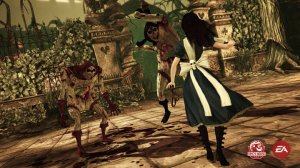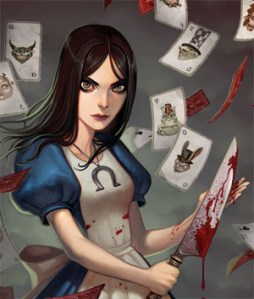For a generation of gamers, American McGee has more than a weird first name going for him. Ten years ago, the renowned game designer delivered American McGee’s Alice, a twisted vision of Lewis Carroll’s classic children’s story that caught up with a emotionally damaged Alice after her adventures in Wonderland. The game found huge financial success, selling a million copies back in the days when such feats were far less common. Alice went back to Wonderland after a great trauma and her journeys there stood as metaphors for the healing process. This angle–deeper than most games of the time–also helped push games as a medium capable of presenting mature and complex issues. McGee went to form several more development ventures, with the latest, Spicy Horse, crafting new games in Shanghai. Despite having done episodic treatments of classic fairy tales in the online game American McGee’s Grimm, it seemed like Alice was way back in McGee’s past.
Then, EA announced that McGee and Spicy Horse would be working on a sequel to Alice that’s set to release in 2011. At EA’s Studio Showcase, I had a chance to talk to McGee and his colleague R.J. Berg about revisiting Alice, the characters he tends to create and what he thinks of the FPS genre now.
So you’re back to Alice. Why is now the time for you to revisit this game that was so popular and so iconic earlier in your career?
American: Sure. Sure. Well, in the last 10 years a lot of history has past. R.J. and I were here back then, built the first game. And then, we went off away from EA. We had a lot of kind of interesting adventures. And in that time, we just weren’t just really ready to come back to it. It wasn’t until a few years ago I went to Shanghai and started up a studio there. And over a couple of years, the studio’s developed the capability to be able to come back and approach something like this. We introduced the studio to EA, and we thought now would be the time. And so, they agreed. And it made sense. And off we go.
(More on Techland: Through the Looking Glass: The Many Alices of Wonderland)
So did you always have Alice as a continuing story in mind from the first game?
American: We knew that the way we ended it didn’t close the door on the concept. And when we were here we certainly saw the ability to extend into a franchise idea that actually touched on lots of fairy tales, Alice included. So, yeah. Certainly, we’ve been continuing to think about that.
Your games tend to have outsider protagonists, whether it’s Scrapland or Bad Day L.A. and, of course, Alice who’s kind of the ultimate outsider. What is it that attracts you to that kind of character archetype?
American: Right. Well, it’s the classic anti-hero, right? And it’s something that I think, especially in games, sets up immediately a much more interesting way for the player to approach who that character is and kind of coming to terms with them. Especially in a third-person perspective game, you’re not trying to assume the role of the character that’s on screen. And so, typically, you want somebody there that the player can find a little bit to identify with but also a little bit to kind of want to stand back from, so that that character on screen always maintains some sense of themselves, their independence. And I think it’s a lot easier to do that when you’re dealing with that type of character archetype.
Do you feel like that’s a sense of, in terms of third-person versus first-person, where you are able to make Alice more kind of viscerally violent because you feel like, “All right. That’s not me doing that. It’s her”?
American: Well, for us the idea of sort of somehow cranking up the violence has never been one of the goals that we’ve had in presenting any of these stories.
Right.
American: Actually, in Bad Day L.A., there was an emphasis on violence as sort of playing it up in a tongue in cheek way because the whole concept was built around, you know, the idea of…
Society crumbling around you.
American: Exactly. But, no. I think in presenting a third person perspective, you’re just setting the character apart from the player. We’re not suggesting to the player that they’re just trying to assume this role. In fact, I think that, especially with Alice, we want the player to come along with her as an equal and let her live and breathe in her own space.
So it was one of the things, probably one of your more infamous quotes has been you wanted to be like Walt Disney, telling stories throughout different mediums.
American: Right.
Do you feel like that’s a goal that is easier to attain now with video games or kind of become more mainstream?
American: Sure. Sure. Well, yeah. When I made that quote, it was definitely coming from a place of thinking about building a business on fairy tales and adapting fairy tales because that’s where Disney’s business came from. But then, there’s also something of a manner of production and being independent, of pushing for a certain type of storytelling or art presentation and sometimes quality as well. Though, if you read about Disney, you see where they had to move the sliders at times in order to get stuff made and quality wasn’t always the thing that was on top in terms of the requirements.
He showed a certain skill at adapting as the thing he was building kept growing.
American: And so, there’s a lot about that story in him as an iconoclast that I think is really attractive that here was a guy who really came from nothing and built an empire.
Sure. Sure.
American: And he did it on top of fairy tales. But I don’t think that the empire itself is what’s interesting. I think that the journey that they took to get there and really more attractive was when they were still small. That’s where that quote came from.
And you feel like that’s informed your own career in terms of the independent route?
American: Yeah.
Because I think the thing that surprised most people about making the game in conjunction with EA was that you’ve been an independent developer for so long. Is EA Partners part of that? People don’t necessarily tend to think of you as being in bed with somebody like EA, at least not anymore.
American: Well, I think EA’s different from when I was here, and EA Partners didn’t exist in this form when R.J. and I were here.
Sure.
American: And so, they’ve made it a lot easier to be partners with them by virtue of being what they are today. But I take your point and I think that, yeah, there has been some sense of sort of being outside for quite a while and certainly a lot of physical travel to the outside.
Well, you’re set up in China now…
American: But I have to say, it’s nice to come back and it’s especially nice to get the kind of support that we’ve had. And I think that a title as big as Madness Returns requires that. It needs something beyond the local concept of it because this is a truly global IP. We’re coming out on PS3, 360, and PC. And we’re addressing a global audience with a piece of IP that is globally appealing.
(More on Techland: Alice in Wonderland, Now Streaming! (The 1903 Edition))
You touched on your previous tenure with EA a little and, earlier in your career, you worked at Id Software on FPSes like Doom, Doom II and the first two Quake games. Do you have any thoughts on how the genre’s changed since you worked in it?
American: You know I moved away from FPSes pretty violently when I left it Id… It was because I saw a lot of the humor going out of it. I saw that the technology was being used to recreate reality in a way that I thought was less about the art and more about trying to sell the violence in a higher quality. And these days, I see lot of FPSes and I walk away from them with feeling of post-traumatic shock. I mean, they are so visceral, so immersive and so focused on putting you in to that [violence]. And just for me personally it’s not the place I really want to be when I am sitting down to play a game. I don’t find that that relaxing.
So we can pretty much rule out you revisiting that genre creatively?
American: If ever there was an opportunity to do something with humor in it, [then maybe.] That’s one of the things I like about the way that the Valve guys have approached their first-person games and also, you know, Ken Levine and the BioShock experience. That’s a truly narrative experience; the violence is a sort of secondary to the narrative. Same thing with the Valve games. Those are character-driven and story-driven experiences. And so if it was ever an opportunity like that, then I think there could be a chance.
Going back to Alice, you said that she’s a globally known character. And she’s been around for more than a hundred years. Why do you think Alice Pleasance Liddell–as compared to other fairy-tale protagonists–is such rich territory that you can continue to mine her for games? You could have ostensibly you know go in the Dorothy/Wizard of Oz direction or with Snow White. What about the character makes you return to Alice?
American: We actually spent a lot of time when working on Grimm to tear apart a lot of other fairytales. And I have done quite a lot of work trying to tear apart and try to do something with Oz, as well. What’s really truly unique about Wonderland is that it is an environment driven truly by the imagination of a single character. In a sense, she and that story is the closest thing that they had a hundred years ago to Neo and The Matrix. I think that it’s really interesting in that respect, because it’s a world in which she can–the same as we can on our dreams–accomplish and do almost anything. Especially, things that are sort of driven by her own personal experiences. Whereas in Oz, there is a certain sort of ruleset, that’s held together by a range of characters and it’s a world unto itself and Dorothy is just a visitor. And the same is true of the lot of the other fairytales. They are very simple tails, and there is only enough there in terms of characters and locations to just present the moral and then to step away. Alice and Wonderland both were landmarks in terms of surreal story telling, in that they didn’t necessarily want to tell you a moral or finish in a way that felt like beginning, middle and end.
(More on Techland: Alice in Wonderland Review: Burton’s Finally Having Fun Again (B+))
Right.
American: And so I think that’s why it’s been fun to play with them with now.
Part of Madness Returns will be happening in 19th Century London. What’s the nature of the juxtaposition we’ll be seeing with Wonderland vs. London? Will there be some of that surreal element in London as well?
American: Can’t talk about that. [Laughter.]
I saw the hint of a smile there…
American: Heh. Can’t talk about that. I wish we could talk about that, but we can’t.
Ok, well if that scenario were to happen, Alice would be a supremely well-equipped character to deal with it. That’s all I’m saying.
American: [[Laughter] There was somebody else who came in this room today and we’ll tell you the same thing we told him which is “Stop being so smart.” So, again, can’t talk about that. [Laughter]
So, my last question is kind of speculative. If you have to give another Wonderland character a starring role in a game, who would be?
American: Wouldn’t do it.
R. J. Berg: No, it’s Alice who’s the reason for the enduring popularity, worldwide admiration and acceptance of this world. Charles Lutwidge Dodgson [Lewis Carroll’s real name] created a character where–by design–it’s her story and no one else’s.
Right.
R. J. Berg: And our goal has been in everything we ever done is to respect that decision and to make a credible attempt to project her life as a young woman, as a heroic young woman dealing with a tragic circumstance. And I think that we will never take a false step, as long as we make that vision of Alice our guiding principle. As we build this product for console and PC with EAP, they’ve allowed us to always respect the heroic nature of a single character.
We shouldn’t expect any Queen of Hearts spinoffs or Cheshire Cat prequels at any point?
Both: Uh-uh. No.
Those are some deep frowns, gentlemen…
[Laughter]
(More on Techland: A Practical Guide to … Traveling Between Worlds)




